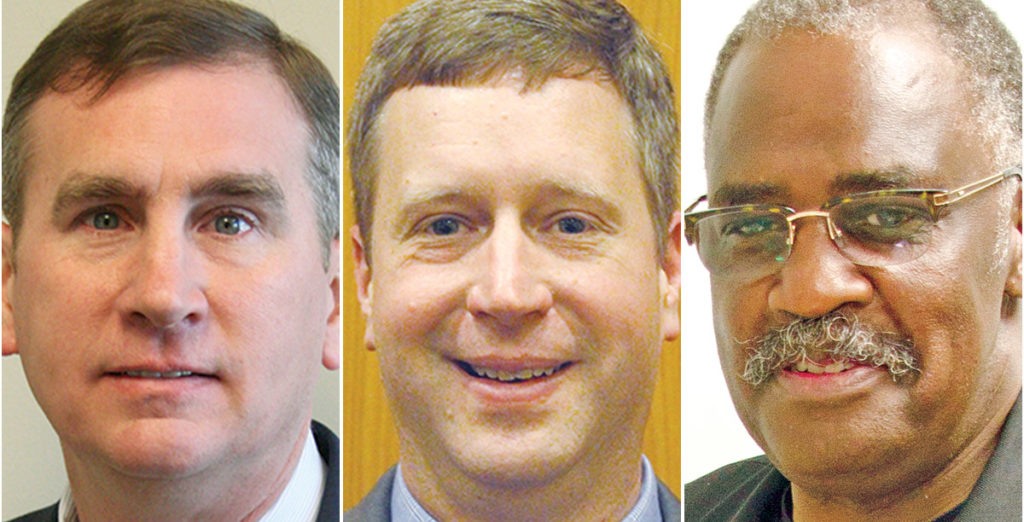Lowndes County supervisors on Monday heard from four firms that could be in the running for providing consulting services for spending American Rescue Plan Act funds.
Services the firms offered ranged from assistance with documentation and compliance to completely managing the county’s ARPA program.
Quoted costs ranged from 2 to 7 percent of the county’s $11.3 million ARPA allocation or hourly rates of $200 to $300 for “a la carte” services.
Representatives with Butler Snow, Horne LLP; The Capitol Group; and Local Government Solutions and Strategies presented to the board on Monday “for informational purposes,” County Administrator Jay Fisher said. In order to be considered for hire, they must respond to a formal request for proposals the county is expected to issue later this year.
“I think it was good for us today to hear from people out there providing these services,” board of supervisors president Trip Hairston told The Dispatch after the meeting. “One concern I have after hearing the presentations is the wide variation of costs for the services. And if we pay the hourly rate, would we get the same level of dedication from the consulting firm?”
ARPA allows counties to spend funds on COVID-19 relief programs; premium pay for essential workers; water, sewer or broadband projects; or to replace revenue loss caused by the pandemic. The county has received half its ARPA funding already, with the other half coming next year. It all must be spent for qualifying uses by the end of 2026.
The firms
Butler Snow, Horne and The Capitol Group all pitched their services with flexibility based on the county’s needs — from simple compliance and reporting help to “A to Z” programming.
Parker Berry, with Butler Snow, said his firm works with a handful of counties and municipalities, as well as provides general advice to the Mississippi Municipal League. So far with ARPA, the majority of their assistance has been helping clients determine what projects are eligible for ARPA, then helping them wade through compliance documents, reporting requirements and contracts with third parties receiving funds from clients.
Butler Snow works on an hourly fee, which Berry said would average $300 per hour.
Both Berry and Troy Johnson, also with the firm, noted “a lot of gray area” in the broad and changing ARPA guidelines. To that, District 1 Supervisor Harry Sanders asked if Butler Snow advised the county incorrectly if the firm would be liable for paying back any misspent ARPA funds.
“Obviously, our opinion would just be our opinion as far as what is eligible,” Berry said. “The buck still falls to y’all to make that decision. … That’s the risk that runs with any form of federal (funds).”
Johnson said, even when clients don’t heed the firm’s advice, it will still work to put them in the “best defensible position.”
However, he seemed particularly wary of using ARPA for employee premium pay, as some cities and counties have decided.
“The biggest issue I’ve seen people asking is ‘who can you spend the money on?’ with employees and things like that,” Johnson said. “There are going to be some times with me that I tell folks, ‘No. I wouldn’t do that.’ Sometimes they listen. Sometimes they don’t.”
Horne helps manage $90 billion in federal money all over the country, including $25 billion in COVID relief funds, representative Timothy Smith told the board. That includes Coronavirus Aid, Relief and Economic Security (CARES) and ARPA for Tennessee, ARPA for Maine, emergency rental assistance in Texas and California, as well as homeowners assistance in Arkansas and Louisiana.
Smith said the firm works specifically to provide “audit-proof” consulting.
“We try to design everything through the lens of an auditor,” he said.
Horne charges a fee of 2 to 5 percent, depending on the scope of services, or an hourly fee that averages $220.
The Capitol Group offers a similar range of services and charges up to 7 percent depending on the scope, representative Haley Martin said. It also gives the option for an hourly rate “comparable to what the other firms have presented.”
Andrew Smith, with Greenville-based Local Government Solutions and Strategies, said his group was a “full-service” consultant that handled everything for a 2-percent fee. That would include leading community meetings in all five county districts and forming the plan based on a blend of what the supervisors and public wanted to see.
Andrew Smith said his firm works with federal money in eight states, ranging from Housing and Urban Development to Community Development Block Grants.
Developing a plan
After the presentations, District 5 Supervisor Leroy Brooks pressed his colleagues on developing a plan for ARPA spending that would guide both the RFP for consulting firms and the scope of the work a firm would be expected to perform.
“I don’t want a consultant to tell us what to do,” Brooks said. “I want us to tell them what we want to do, and they tell us how we can do it.”
Fisher said the county would not qualify for tax revenue loss from COVID, so it would need to prioritize projects in the other three categories — premium pay, COVID relief and water/sewer/broadband.
Sanders asked Fisher if the county could use ARPA funds to reimburse its coffers for extra paid sick leave given to employees for COVID-related reasons. Fisher said that was doubtful.
I haven’t seen anything in the guidance that indicates that’s possible,” Fisher said.
Supervisors agreed to each submit a list of priorities for ARPA spending to Fisher in time for him to compile and present those priorities Oct. 15. Brooks also suggested the county look at hiring a specific administrator to work directly with the consultant and oversee ARPA so that Fisher and county Chief Financial Officer Lloyd Price aren’t “overburdened.”
Hairston, after the meeting, said he would be open to that, especially when considering possibilities like setting up grant programs for rural water departments in the county.
“I certainly would look at it for sure,” Hairston said. “It may not be a bad idea.”
EMCC board finalists; citizen honored for rescue
Supervisors selected three finalists from among 10 finalists for the county’s vacancies on the East Mississippi Community College Board of Trustees.
Paccar general manager Andrew Appel, heart surgeon Richard Eubanks Jr. and Columbus Mayor Keith Gaskin will all be invited to appear before the supervisors Oct. 15. Two will be selected to the EMCC board.
Those appointees will replace Joe Max Higgins and Greg Stewart, both of whom resigned with unfinished terms. EMCC has campuses in Scooba and Mayhew, as well as the Communiversity vocational training center on Highway 82 in Lowndes County and Lion Hills Center in Columbus.
Lowndes, Oktibbeha, Clay, Noxubee, Kemper and Lauderdale counties each appoint two trustees to the board.
In other business, supervisors honored Chad Surinis with a resolution for rescuing a woman in Steens recently after she had crashed her car into a pond.
Zack Plair is the managing editor for The Dispatch.
You can help your community
Quality, in-depth journalism is essential to a healthy community. The Dispatch brings you the most complete reporting and insightful commentary in the Golden Triangle, but we need your help to continue our efforts. In the past week, our reporters have posted 51 articles to cdispatch.com. Please consider subscribing to our website for only $2.30 per week to help support local journalism and our community.




